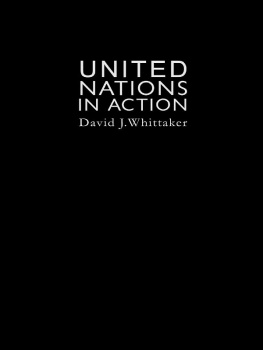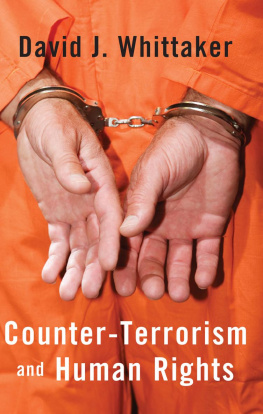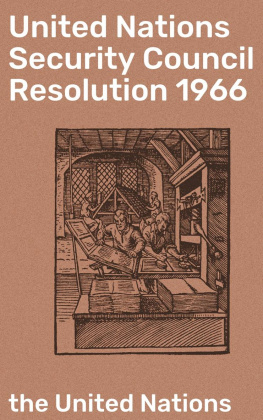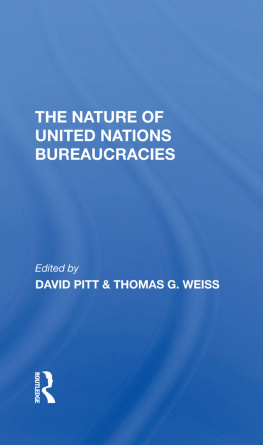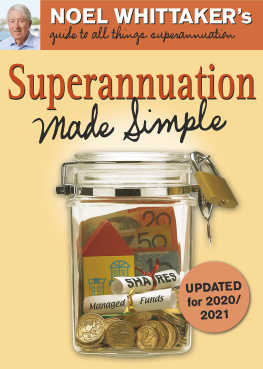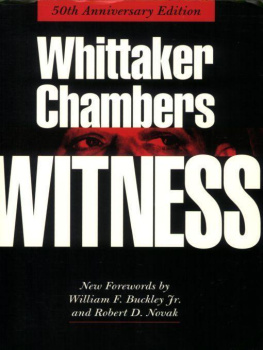David J.Whittaker, 1995
This book is copyright under the Berne Convention.
No reproduction without permission.
All rights reserved.
First published in 1995 by UCL Press
UCL Press Limited
University College London
Gower Street
London WC1E 6BT
This edition published in the Taylor & Francis e-Library, 2003.
The name of University College London (UCL) is a registered trade mark used by UCL Press with the consent of the owner.
British Library Cataloguing in Publication Data
A catalogue record for this book is available from the British Library.
ISBN 0-203-49919-0 Master e-book ISBN
ISBN 0-203-56117-1 (Adobe eReader Format)
ISBN: 1-85728-114-4 HB
1-85728-115-2 PB
Preface
The reader may wonder whether one more book about the United Nations (UN) is needed. This is a book, however, with a number of differences. Its main purpose is to illustrate the UN in action. A selection of case-studies is presented to show the UN dealing with threats to peace and the violation of basic human rights, aiding social and economic development in many lands and meeting the global challenges of AIDS, drug abuse and famine. Fifty years have elapsed since the foundation of the UN and this seems a particularly appropriate time for appraisal of the organizations work and achievements.
Again, this is offered as an introductory text. The case-studies are written straightforwardly and end with brief notes and suggestions for further reading. Each chapter has a Quick reference page as a brief guide to complex facts and legislation and the chronology of events. An Appendix, Where to findout more about the UN, directs the reader to sources of further information. A page of Abbreviations at the beginning of the book lists some of the commonly used acronyms, including UN missions.
Essentially, this is a critical book in the sense that T.S.Eliot once thought of criticism as strong black coffee. Seeking to be as objective as possible, it is aimed at stimulating the reader to learn about the work of a great international organization, the United Nations, and then discuss findings with others, speculate, and go on to read more widely.
The book is organized in six parts. Part I introduces the institutional shape of the UN, its purpose, principles, and its structure. Part II, Peacekeeping andcollective security, considers the major field of UN action. It has been said that peacekeeping operations are like a set of tools that the UN may be allowed to use by parties to a dispute. After a preliminary survey of theory and practice since 1945, set against the larger issues of collective security, selected case-studies are presented to suggest the possibilities and limitations of UN approaches. The scenarios are all dramatically different. Part III, Nuclearquestions, deals with the efforts UN members have exercised over half a century tocope with the proliferation and testing of nuclear weaponry. Two case-studies record strenuous debate, some experiment, and the stubborn persistence of argument and delay.
Part IV, Human rights, centres on the UNs concern to establish and preserve individual and collective human rights. Three case-studies range over decades of steady work against sex inequality, racial intolerance and gross violation of basic rights. Part V, New nations, shows the UN as midwife bringing groups of people from a state of dependence into self-determination and full statehood. Three case-studies show the UN active in the New York Headquarters and in the field, engaged in risky but carefully executed programmes of community development, in Namibia, West Irian and Cambodia. Understandably, these operations have not lacked controversy. Part VI is called New initiatives. The world today has changed dramatically since the time of the UNs birth. In many respects the world has shrunk in size as the interrelationship of problems has expanded. No nation can ignore the vulnerable fragility of our environment, escape the pervasive influence of drug-dependence by its people, or the spread of AIDS. Nor can people in some regions of Africa be left to starve. Four case-studies here highlight the UN grappling with a major global challenge.
This selection of case-studies has been assembled to illustrate the breadth and variety of UN work. Inevitably, they record the UN sometimes succeeding, sometimes floundering, and, at times, failing. They reveal complexity and delay for, after all, the UN is an organization supported by people from 185 states. Above all, the case-studies pose questions and it is right that they should. Questions are a prelude to re-examination and reform.
Should the myth of the primacy of the great-powers now be replaced by a fairer composition of the Security Council? Are there archaic and complacent elements in the UN Charter that could be modified, even removed, by a two-thirds majority of the General Assembly? And then there is the General Assembly itself. It is sometimes suggested that the Assembly is pure theatre and the nations delegates mainly actors. The UN Charter begins with a reference to the Peoples of the United Nations. Are there ways in which they could be represented more appropriately and with a permanence that is not granted to the accredited non-governmental organizations?
Keeping the peace, working for collective security, and promoting and protecting human rights, are three great areas for states acting together. First, in regard to peacekeeping, the case-studies show states now demanding the impossible of the UNpolitically, financially and logistically. Each crisis and each response is different, yet they point to many issues still undecided. Would, for example, the establishment and deployment of some sort of standing force, say, a rapid deployment force, be able to act quickly and save lives? What is the point of anaesthetizing a conflict as has happened in Cyprus? Are UN members so bankrupt in cash and creative ideas that they cannot push the process of peacebuilding more urgently and more systematically? Cambodia and Namibia will be seen as instances of experiment taking some hold.
Secondly, there is the whole notion of collective security. Is there a way for the UN to work towards packages of regional security, using organizations such as the Organization (formerly the Conference) on Security and Cooperation in Europe (OSCE), the Organization of African Unity (OAU), or the Organization of American States (OAS) rather than continue to strive for the hazy ideal of a global scheme? In any case, some regional security arrangements appear to be contrived by bilateral negotiation, where the UN is sidelined, as has happened in the Middle East. Is this inevitable?
Thirdly, there is the matter of human rights. The UN does not hesitate to legislate, to monitor, to condemn, even to isolate. Yet enforcement is difficult as Cambodia, Bosnia, Rwanda and Haiti show. Elsewhere, there is discrimination in various forms and constant evasion. The campaign against apartheid suggests ways in which a world community can influence an erring and stubborn government to change its ways. External influence apart, there is frequent speculation about circumstances that would justify the UN crossing inviolable national frontiers to check unacceptable and gross violation of human rights.
Finally, the pace of most UN work is never that of the quick fix. Most of it is steady, perhaps imperceptible, possibly erratic. The UN in its fiftieth year seems to be moving forward on many fronts with a consensus and with publicity never seen before in the darker days of international politics. The recent words of the present UN Secretary-General, Boutros Boutros-Ghali, seem an appropriate foreword to the task of this book. He says:


